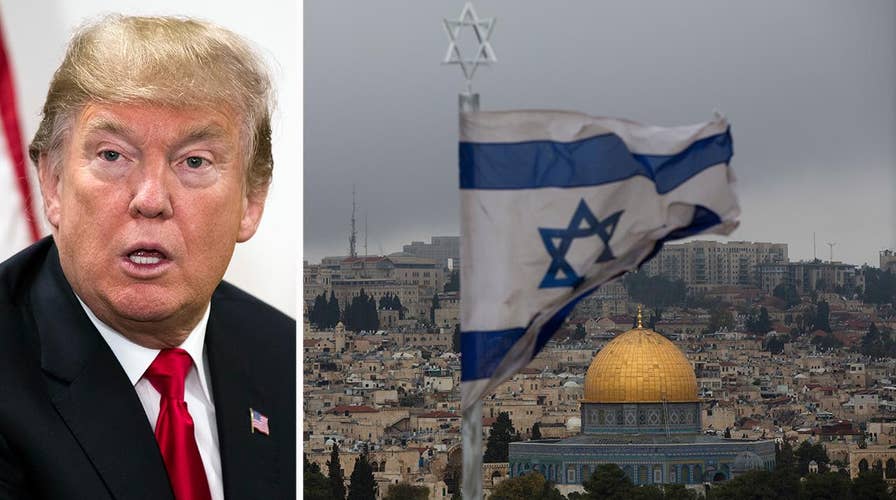President Trump to declare Jerusalem as Israel's capital
Opponents say the move tanks a peace deal between Israelis and Palestinians.
President Trump’s declaration Wednesday that the United States formally recognizes Jerusalem as Israel’s capital city is an acknowledgement of historical fact and current reality.
As Israel’s closest ally, as the principal facilitator of Arab-Israeli peacemaking, and as the pre-eminent global leader, the U.S. initiative in taking this step is of critical significance. The president has acted wisely.
Bold actions can prompt new thinking and stimulate initiatives to advance peace. Forty years ago last month, Egyptian President Anwar Sadat flew to Israel. He became the first Arab head of state to visit and he addressed the Knesset (parliament) in Israel’s capital of Jerusalem, even before formal peace negotiations began.
Recognition of the city that Israel has always deemed its capital is long overdue. The prime minister’s office, the Knesset, and nearly all Israeli government offices have been situated in Jerusalem since Israel declared its independence nearly 70 years ago.
U.S. recognition of Jerusalem as Israel’s capital is an act of constructive diplomacy – not, as one Palestinian leader proclaimed, a “declaration of war.”
Heads of state and other top officials from countries around the world visit Jerusalem regularly to engage with Israel’s leadership.
In fact, there was a time when 16 countries maintained their embassies in Jerusalem. Succumbing to Arab pressures, however, they relocated their embassies to Tel Aviv, where the U.S. and other countries have long kept their embassies.
This perpetuates a nonsensical abnormality. No other country in the world has been treated this way, neither in bilateral relations nor at the United Nations and other multilateral forums.
Longstanding resistance to recognizing Jerusalem as Israel’s capital has encouraged many U.N member states, led by Arab and Muslim nations, to regularly adopt resolutions that ignore historical facts and deny any Jewish link to Jerusalem.
Indeed, just last week, the U.N. General Assembly voted 151 to 6 (with nine abstentions) to adopt another resolution disavowing Israeli ties to Jerusalem.
But the ties are authentic and deep. For millennia, Jerusalem has been uniquely connected to Judaism and the Jewish people, and thus it was only natural that it would become the capital of Israel.
U.S. recognition sets the stage for moving the U.S. embassy to Jerusalem. When that happens, the new embassy will be located in a neighborhood in western Jerusalem, an area that has been under Israeli sovereignty since its independence in 1948.
The status of the disputed eastern part of the city will be resolved through the peace process, in direct negotiations between Israel and the Palestinian Authority.
Tragically, Palestinian leaders continue to prefer confrontation over resuming negotiations to achieve an enduring comprehensive peace based on a two-state solution.
Even before President Trump delivered his speech recognizing that Jerusalem is indeed the capital of Israel, Palestinian and other leaders of Arab and Muslim countries issued threats of protest and violence.
U.S. recognition of Jerusalem as Israel’s capital is an act of constructive diplomacy – not, as one Palestinian leader proclaimed, a “declaration of war.”
A more practical response from the Palestinians would be to urge a resumption of peace talks on final-status issues. Hopefully, clearer heads will eventually prevail over the initial, highly emotional and dangerous reactions.
Rational thinking in the conflict has been too rare. But when exercised, it has led to constructive peacemaking solutions and the building of ties between Israel and its neighbors, as well as many countries beyond the region. These should not end or recede because of any violent responses to President Trump's action.
In the future, with prudent hindsight, we will look back at Dec. 6, 2017 as a day of clear-headed and purposeful action by the White House.

